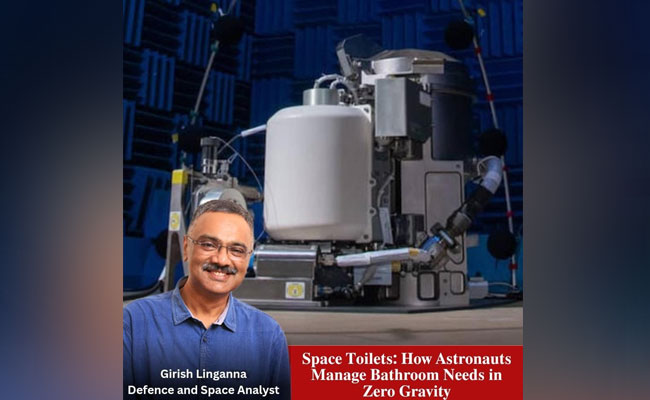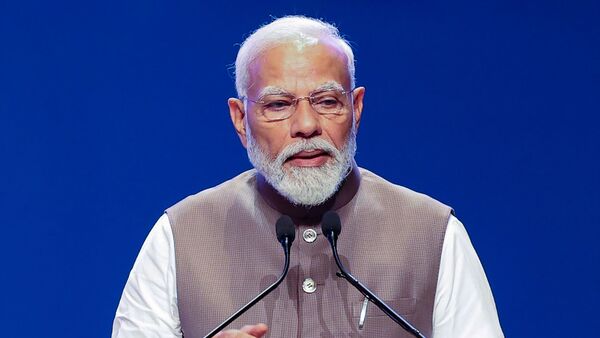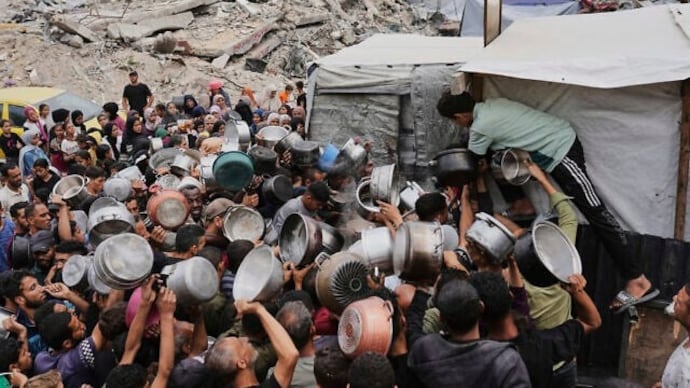Whether it's a basic hole or a luxurious gold-plated toilet, gravity on Earth ensures our waste is pulled away from us. But for astronauts, using the bathroom is trickier. In space, where there's no gravity, any floating waste can be a problem. This is a health risk for the astronauts and a threat to the important machinery inside the space station.
In space or on the International Space Station, using the bathroom requires caution and the use of suction.
In 1961, Alan Shepard was the first American to go to space. His journey was meant to be brief, so there were no arrangements for him to use the bathroom. However, after he got into the rocket, the launch got delayed for more than three hours. Shepard needed to pee and asked to leave the rocket for that. But to avoid further delays, mission control decided it was okay for him to pee in his spacesuit. So, the first American in space traveled with a wet undergarment.
Luckily, there's now a toilet on the space station. The first one, made in 2000, was mainly for men and not easy for women. It required peeing standing up. For pooping, astronauts had to strap their thighs to sit on the small toilet and make sure their bottom was sealed tight to the seat. This toilet didn't work too well and was tough to clean.
In 2018, NASA spent $23 million on a better toilet for astronauts on the International Space Station. This new toilet uses a vacuum to deal with the challenges of going to the bathroom in zero gravity. It has two parts: a hose with a funnel for peeing and a small, raised seat for pooping.
The space bathroom has lots of places to hold onto so astronauts don't float away while using it. For peeing, they can either sit or stand. They need to use the funnel and hose carefully against their skin to prevent leaks.
To poop, astronauts raise the toilet lid and sit down, similar to toilets on Earth. However, this space toilet starts sucking in air as soon as the lid opens. This helps keep everything from floating away and also helps with the smell.To make sure it fits tightly against their bottom, the toilet seat in space is smaller than the ones we use at home.
Pee is mostly water, and because water is heavy and takes a lot of space, it's better to recycle pee instead of bringing fresh water from Earth. All the pee from astronauts is collected and purified into clean water for drinking. Astronauts often joke that the coffee they drink today is made from yesterday's coffee.
Sometimes, scientists bring astronaut poop back to Earth to study it. However, usually, bathroom waste, like poop, is burned up. The poop is sucked into trash bags, which are then sealed in airtight containers.Astronauts also add toilet paper, wipes, and gloves to the containers for cleanliness. These containers are then placed in a cargo ships that came to the space station. This ship is sent back towards Earth, where it burns up in the Earth's upper atmosphere.
When you see a shooting star, it could be a meteorite burning in the Earth's atmosphere, or it might even be astronaut poop on fire. Also, remember to be grateful for gravity's assistance next time you need to use the bathroom.
(The author of this article is a Defence, Aerospace & Political Analyst based in Bengaluru. He is also Director of ADD Engineering Components, India, Pvt. Ltd, a subsidiary of ADD Engineering GmbH, Germany. You can reach out to him at: girishlinganna@gmail.com)
Let the Truth be known. If you read VB and like VB, please be a VB Supporter and Help us deliver the Truth to one and all.
New Delhi (PTI): Prime Minister Narendra Modi on Sunday expressed grief at the loss of lives in a stampede at the Mansa Devi temple in Uttarakhand's Haridwar.
At least six people died in the incident that occurred around 9 am.
In a post on X, Modi said, "Deeply saddened by the loss of lives due to a stampede on the route to Mansa Devi temple in Haridwar, Uttarakhand. Condolences to those who lost their loved ones. May the injured recover soon. The local administration is assisting those affected."





